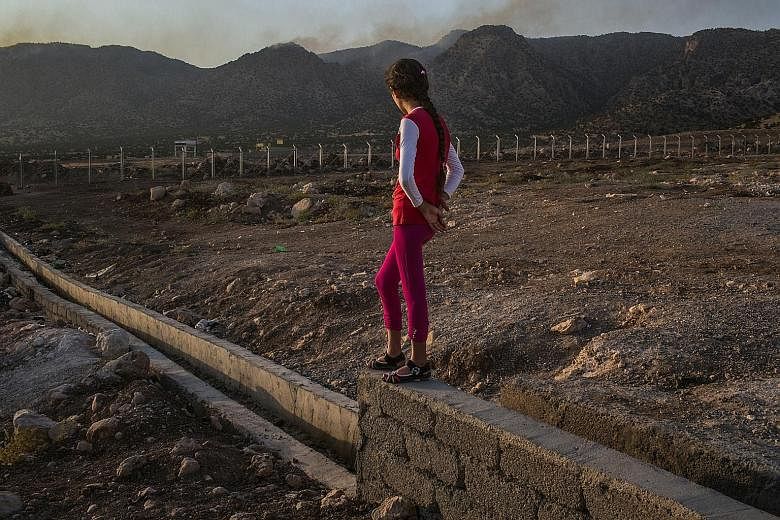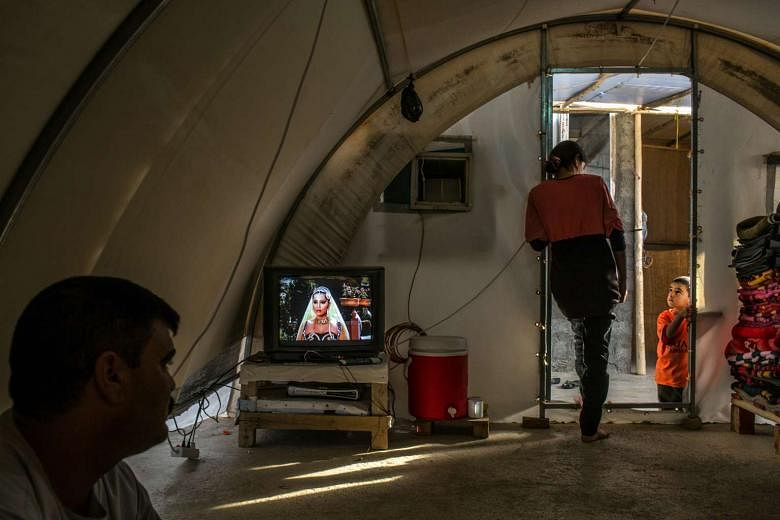QADIYA (Iraq) • In the moments before he raped the 12-year-old girl, the fighter from the Islamic State in Iraq and Syria (ISIS) took the time to explain that what he was about to do was not a sin.
Because the girl practised a religion other than Islam, the Quran not only gave him the right to rape her, it condoned and encouraged it, he insisted. He bound her hands and gagged her.
Then he knelt beside the bed and prostrated himself in prayer before getting on top of her.
When it was over, he knelt to pray again, bookending the rape with acts of religious devotion.
"I kept telling him, 'It hurts, please stop,'" said the child.
"He told me that according to Islam, he is allowed to rape an unbeliever. He said that by raping me, he is drawing closer to God," she said in an interview next to her family in a refugee camp here, to which she escaped after 11 months of captivity. The systematic rape of women and girls from the Yazidi religious minority has become deeply enmeshed in the organisation and the radical theology of ISIS in the year since the group announced it was reviving slavery as an institution.
Interviews with 21 women and girls who recently escaped, as well as an examination of the group's official communications, show how the practice has been enshrined in its core tenets.
A total of 5,270 Yazidis were abducted last year, and at least 3,144 are still being held, according to community leaders.
To handle them, ISIS has developed a detailed bureaucracy of sex slavery, including sales contracts notarised by extremist-run courts.
It has established a network of warehouses where the victims are held, viewing rooms where they are inspected and marketed and a dedicated fleet of buses used to transport them. The practice has also become a recruiting tool to lure men from deeply conservative Muslim societies, where casual sex is taboo and dating is forbidden.
A growing body of internal policy memos and theological discussions has established guidelines for slavery, including a lengthy how-to manual issued by ISIS' research and fatwa department last month.
Its leadership has repeatedly emphasised a narrow and selective reading of the Quran and other religious rulings to not only justify violence, but also to celebrate each sexual assault as virtuous.
"Every time that he came to rape me, he would pray," said F, a 15-year-old girl who was captured on Mount Sinjar one year ago and sold to an Iraqi fighter in his 20s.
She wanted to be identified only by her first initial because of the shame associated with rape.
"He kept telling me this is ibadah," she said, using a term from Islamic scripture meaning worship.
"He said that raping me is his prayer to God. I said to him, 'What you're doing to me is wrong, and it will not bring you closer to God.'
"And he said, 'No, it's allowed. It's halal,'" said the teenager, who escaped in April with the help of smugglers after being enslaved for nearly nine months.
The introduction of systematic sexual slavery by ISIS dates to Aug 3 last year, when its fighters invaded the villages on the southern flank of Mount Sinjar in northern Iraq.
Its valleys are home to the Yazidis, who represent less than 1.5 per cent of Iraq's estimated population of 34 million.
Survivors say that men and women were separated within the first hour of their capture.
In village after village, the men and older boys were massacred.
The women, girls and children were hauled off in open-bed trucks.
"The offensive on the mountain was as much a sexual conquest as it was for territorial gain," said Mr Matthew Barber, a University of Chicago expert on the Yazidis.
He was in Sinjar when the onslaught began last summer and helped create a foundation that provides psychological support for the escapees, who number over 2,000, according to community activists.
"It was 100 per cent pre- planned," said Yazidi community activist Khider Domle, who maintains a detailed database of the victims. "I spoke by telephone to the first family who arrived at the Directory of Youth (building) in Mosul, and the hall was already prepared for them.
"They had mattresses, plates and utensils, food and water for hundreds of people."
Reports by Human Rights Watch and Amnesty International had the same conclusion about the organised nature of the sex trade.
In each location, survivors say the fighters first conducted a census of their female captives. Each of them was instructed to state her first, middle and last name, her age, her hometown, whether she was married, and if she had children.
F said she was held for two months. Then one day, the fighters came and began removing young women. Those who refused were dragged out by their hair, she said.
F, along with 24 others, were driven to an army base in Iraq where she heard the word "sabaya" for the first time.
"They laughed and jeered at us, saying 'You are our sabaya.' I didn't know what that word meant," she said. Later on, the local ISIS member explained it meant slave.
"He told us that Taus Malik (one of seven angels to whom the Yazidis pray) is not God.
"He said that Taus Malik is the devil and that because you worship the devil, you belong to us. We can sell you and use you as we see fit."
The ISIS sex trade appears to be focused on the Yazidis.
Mr Barber believes that is because they are polytheists, with an oral tradition rather than a written scripture. In the eyes of ISIS, that puts them on the fringe of despised unbelievers, even more than Christians and Jews, who are considered to have some limited protections under the Quran as fellow "People of the Book".
In its online magazine, ISIS made it clear that their campaign of enslaving Yazidi women and girls had been extensively pre-planned.
The article said that they were to be treated as spoils of war and had no chance to pay a tax known as jizya to be set free, "unlike the Jews and Christians".
In much the same way that specific Bible passages were at one time used to support the slave trade in the United States, ISIS cites specific verses or stories in the Quran or the Sunna, the traditions based on the sayings and deeds of the Prophet Muhammad, to justify their human trafficking, experts say.
Many Islamic scholars argue that slavery figures in Islamic scripture in much the same way that it figures in the Bible, as a reflection of the time in which the religion was born.
"In the milieu in which the Quran arose, there was a widespread practice of men having sexual relationships with unfree women," said associate professor of religion Kecia Ali at Boston University, the author of a book on slavery in early Islam.
"It wasn't a particular religious institution. It was just how people did things." But Mr Cole Bunzel, a scholar of Islamic theology at Princeton University, disagrees.
He points to the corpus of Islamic jurisprudence, which he says includes detailed rules for the treatment of slaves.
Mr Bunzel said: "You can argue that it is no longer relevant and has fallen into abeyance. ISIS would argue that these institutions need to be revived, because that is what the Prophet and his companions did."
NEW YORK TIMES


